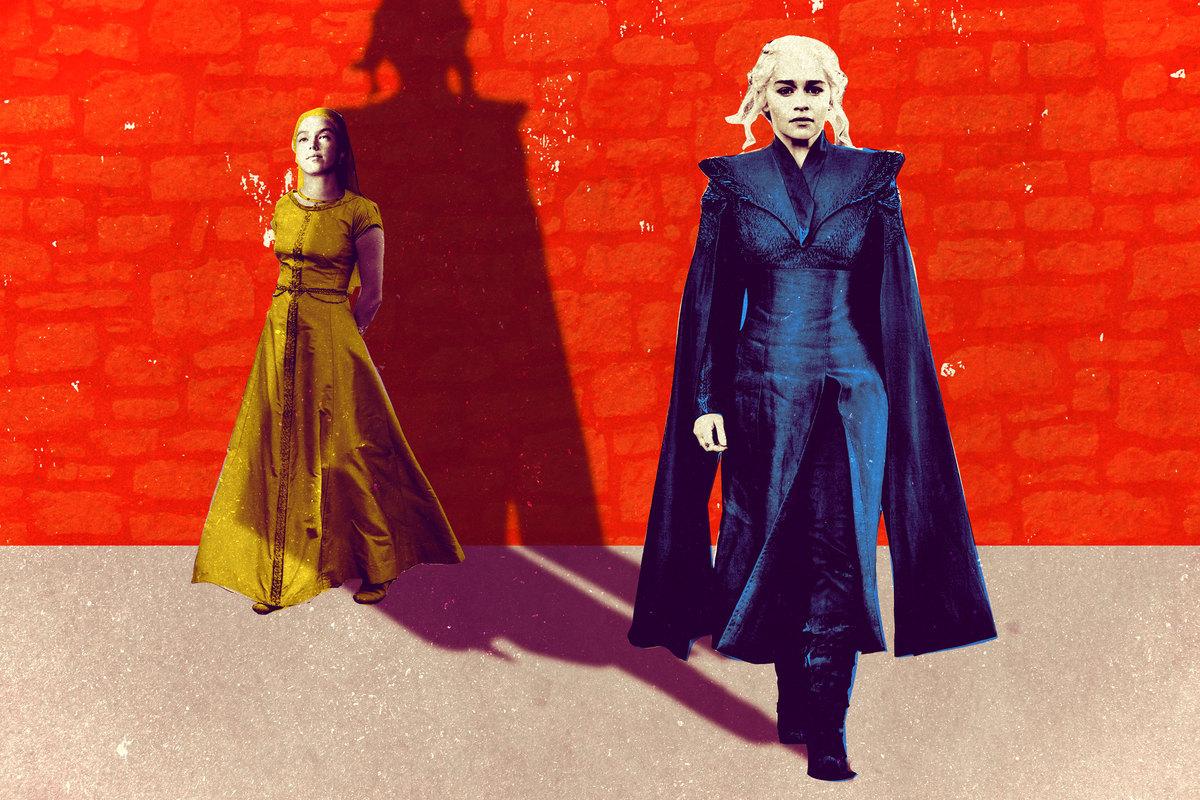What Constitutes Success for ‘House of the Dragon’?
With its forthcoming prequel to ‘Game of Thrones,’ HBO is still playing to win—but what would winning look like for the much-hyped, high-stakes follow-up to TV’s biggest blockbuster?
“The Iron Throne is the most dangerous seat in the realm,” Viserys I Targaryen observes in the trailer for HBO’s House of the Dragon. That’s true in two respects. First, there’s the seat itself. Designed based on the principle that “a king should never sit easy,” the Iron Throne provides little lumbar support; one can’t recline without risking impalement, or at least a nasty scratch. Multiple monarchs, not excepting Viserys, have injured themselves on their own seat of power’s protruding blades. And forget about a footrest or an included cupholder.
More concerning still is the danger from rivals to the throne—the foes, former friends, and family members who seek to displace the current ruler and gingerly park their own royal rears on the seat. Yet despite the discomforts and dangers of presiding over the Seven Kingdoms, it sometimes seems as if everyone in Westeros wants to sit on the spiky chair—and once there, no one wants to leave.
HBO has been there. The network climbed to the pinnacle of popularity with Game of Thrones, which ran from 2011 to 2019 and ruled the small-screen landscape in its later seasons. Toward the end of the series’ run, the network weathered stings from within and assaults from without: Many fans bemoaned the show’s rushed ending, and many competitors set their sights on making a Thrones of their own. Between the notorious series finale (called, of course, “The Iron Throne”) and the head of House Bezos massing his money to finance fantasy headliners for Amazon—not to mention the proliferation of streaming services, the small-screen ascendance of Marvel and Star Wars, and the successful launches of other “unfilmable” epics emboldened by Thrones—the TV crown is increasingly contested.
And so, six years after the network announced that Thrones would end with its eighth season, HBO is ready to roll out its bid to bolster the line of succession. If Thrones was the Old King, whose storied reign was unchallenged, then HBO is hoping that the prequel House of the Dragon, which premieres August 21, will be the Young King, Viserys, who sustained and extended his predecessor’s grasp on power and prosperity. (For a few decades, at least.)
But not all transfers of power prove so smooth. The uncertainty surrounding the future of the Targaryen dynasty supplies the in-universe story of House of the Dragon. And the similar uncertainty clouding the future of the Thrones franchise provides plenty of IRL intrigue. As Viserys also says in the trailer: “Our line is vulnerable, too easily ended.” Not only is that true of Viserys’s side of the Targaryen clan, but it also applies to HBO’s biggest franchise, which thus far consists of a single, singularly must-see series. Thrones burned brighter than any of its TV contemporaries, flamed out somewhat spectacularly—quality-wise, if not in terms of attention—and then lay dormant for a few years. As the debut of the long-awaited, eagerly anticipated prequel draws near, HBO and industry watchers will be wondering: What constitutes success for the follow-up to one of this century’s biggest blockbusters?
The legacy of Thrones looms large in the print previews that appeared in Entertainment Weekly and The Hollywood Reporter last month. “You can’t follow Thrones, it’s the Beatles,” Dragon writer and co-showrunner Ryan Condal told THR. Yet follow Thrones the series must, which would make the best-case scenario, what, Wings? With nine dragons set to appear in Season 1—and a total of 17 planned, should the whole “Dance of the Dragons” tale from George R.R. Martin’s Fire & Blood be told—wings will be plentiful. To stick with this strained analogy: Will this series be the Wings that initially eschewed Beatles songs in its set lists to distinguish itself from its predecessor, or the mid-’70s incarnation of the band that embraced its Beatles past and pedigree? The previews paint a picture of a network, and a creative team, that struggled with whether to try to set itself apart from Thrones or to align itself with and draft off that series’ success.
“We have this huge legacy to carry forward,” Condal told EW. “[And we want to] do that in the best way that honors what came before, but also doesn’t do the thing that I think a lot of sequels do: Here’s [what] you love wrapped up in a different packaging.” Or as HBO and HBO Max chief content officer Casey Bloys told The New York Times this week, “The trick here is, you don’t want to just remake the original show. You want to make a show that feels related and honors the original, but also feels like its own.”
The message seems clear: This isn’t just Thrones with different dragons and Targaryens. Elsewhere in the EW piece, though, Condal notes that Martin pushed for the Dance of the Dragons to be adapted because he thought it was “the thing that had the most direct … linkage tonally to that first episode of Game of Thrones.” Was Thrones a shadow to escape or a shadow to shelter under?
It took time and one notable stumble—an expensive pilot for a canceled, distant-prequel series with the working title of Bloodmoon—for HBO to make up its mind. “The desire at HBO was to not just offer up a sequel that’s about the war for the throne,” Condal told THR. “They wanted to do something so totally different that it would blow everybody’s minds.” In the same article, Thrones director and Dragon co-showrunner/director Miguel Sapochnik recalls, “At first HBO was like, ‘How can we subvert [Thrones]?’ The Dance of Dragons felt like an obvious straight-down-the-line prequel. So I think they were less hot on it because it was like, ‘Well, who wants to see more Game of Thrones?’ And then the irony, of course, is: lots of people.”
After the Bloodmoon debacle, HBO was less interested in straying from a proven formula. Sapochnik told THR that when Bloys asked him what he would “do directorially,” he responded, “If it ain’t broken, don’t fix it,” to which Bloys said, “Good.” Sapochnik’s quote continues, “I think Season 8 had been divisive, Bloodmoon hadn’t worked out for them, and they wanted to retain their fans. They wanted to come back to what they knew.”
The downside of assembling this series from a similar blueprint is that the prequel will be compared even more closely to the original—and any deficiencies relative to Thrones will be extra obvious. If the series doesn’t “do Thrones” as well as Thrones did, it won’t be bailed out by novelty. On the plus side, more material that feels like vintage Thrones—not just in terms of sex, violence, and dragons, but when it comes to complex characters and compelling political maneuvering—would probably be well-received by fans who miss the original’s heyday, as long as it doesn’t tread too close to familiar plot lines. The footage shown thus far seems to nestle into that sweet spot, which has some disillusioned Thrones fans feeling bullish about the franchise for the first time in years.
Because it takes place close to 200 years before Thrones, too early for crossover characters, Dragon may sidestep some of the lack of suspense that often plagues prequels; viewers who haven’t read Fire & Blood or memorized every morsel of lore from Thrones won’t necessarily know what’s in store. (Though veteran readers won’t ever wonder the way they did once Thrones moved beyond the books.) And although the stakes aren’t quite as high as those of Thrones—this time, no White Walkers will threaten the Wall—the series won’t skimp on spectacle. Fire & Blood isn’t as detailed as A Song of Ice and Fire, but House of the Dragon won’t ever outstrip its source material like the latter seasons of Thrones did, and Martin will be willing and able to fill in any lore gaps.
In other ways—including time jumps, an unreliable (and less well-informed) narrator, lots of similarly named, extremely blond characters, and, relatedly, even more incest—adapting Fire & Blood is even more daunting than adapting A Song of Ice and Fire. Except, of course, for one thing: Thrones already demonstrated that Martin’s world would translate to TV and, in the process, spawned a bigger built-in audience for Dragon. HBO EVP Francesca Orsi told THR, “I don’t think anybody is thinking this show will pick up, from a ratings perspective, right where Thrones left off.” (Which Bloys echoed to the Times, perhaps partly in an attempt to lower expectations.) But it probably won’t pick up where Thrones started, either. A significant portion of the almost 20 million viewers who watched the Thrones finale live or shortly after it aired will probably give Dragon a chance, which puts the pressure on but also presents an opportunity.
Asked in June about how he’ll assess the performance of the series, Bloys told Variety that “the measure of success is the same kind of metrics that we use for everything. Which is some combination of ratings, of reviews, of buzz, all of the above. But there’s no threshold for, ‘It’s gotta hit this many viewers’ or anything like that.”
But Dragon isn’t just any series, so we can probably intuit some slightly less vague goals. Granted, Dragon doesn’t have to be a Thrones-level smash, in this season or subsequent ones, to qualify as a win for HBO. Counting on any show to be the “next Game of Thrones” is too tall an order, even if it’s a branch of the same IP tree; as former WarnerMedia chairman Bob Greenblatt told the Times about the potential prequel bakeoff that eventually led to Dragon, “we all knew no sequel or prequel would probably ever rise to the level of the original.” Better Call Saul, perhaps the best prequel ever, is made by many of the same people as Breaking Bad, is set in the same city, and airs on the same network. But even though it’s every bit as good as Breaking Bad—arguably better!—it’s not quite as culturally resonant. Granted, Saul started as a slow burn that didn’t try to run back Breaking Bad, but even if it had, it probably couldn’t have captured the country’s attention to the same extent. A lot has to happen for a show to join the popular pantheon, and the more the audience and cultural conversation splinter, the harder it is to generate the same ratings and create the same hype.
Thus, House of the Dragon can aim for more modest targets than making lightning strike a second time. The first is to quiet the talk about Thrones Season 8. It’s been more than three years since “The Iron Throne” aired, but the bitter aftertaste of the endgame still dominates discussions about the series, even though the good times far outnumbered the bad. As long as Season 8 is still the last word on Thrones, that down note will hang in the air. The debut of Dragon could drown it out and change fans’ focus from the IP’s past to its present and future.
Speaking of the future: The series’ second objective is to make good on what any sci-fi/fantasy tentpole these days is designed to do—spawn successors. To this point, Game of Thrones has been a franchise in the same sense that Viserys III was a king; more as a self-styled title than as a going concern. The Thrones on-screen universe has been as slow to hatch as a dragon egg at Summerhall, which is one reason Season 8 still smarts. Not only would a strong start to Dragon guarantee that the rest of the Dance of the Dragons will be brought to TV—followed, perhaps, by the continuing tale of the Targaryens as the series switches to an anthology format after Season 3 or Season 4—but it would also buoy the lineup of live-action shows in development, from Tales of Dunk and Egg to the Jon Snow spinoff to the Sea Snake prequel-to-a-prequel. Per the tallies in THR, the fates of four live-action series and three or four animated projects may depend on how Dragon does. Ultimately, the best gauge of the series’ reception may not be how long it runs, but how many subsequent stories from the Martinverse reach the screen, and whether any of them fulfills Martin’s dream of inspiring an offbeat project that doesn’t hinge on another fight for the Red Keep.
In the THR preview, Sapochnik calls Dragon “a spine to other possible stories and spinoffs.” It’s crucial, then, that this back doesn’t break. As THR’s James Hibberd wrote about HBO’s planning for a Thrones successor, “To follow Thrones with failure would be highly embarrassing and expensive. Yet the rewards … well, the rewards were potentially staggering: a content stream of titles that could span decades and generate billions in revenue.” A second success—even if it’s smaller than the first—would end any whispers about Thrones as a one-off sensation, propel the IP into the realm of ever-expanding cinematic and TV universes that may never die, and insulate it from Warner Bros. Discovery’s cost-cutting at a time of domestic streaming stagnation.
According to EW, Olivia Cooke, who plays the adult Alicent Hightower, “hopes the show won’t be as big as the mothership series,” while Emma D’Arcy, who plays the adult Rhaenyra, has tried not to think about how huge it may be. It’s certain that the suits at HBO have been hoping and thinking, though they’ve surely shared the anxieties of their lead actors. “They were understandably very nervous about failing and not living up to the original series,” an “insider” told THR, adding that “I don’t think there was much confidence internally [that Thrones was a franchise] because the show was so big and so seminal.” Dragon is arriving too late to fulfill the network’s old dream of a Thrones prequel serving as the Mandalorian to HBO Max’s Disney+, but it could correct the worst (and most misogynistic) missteps of its antecedent series, be a boon in the short term to HBO’s Succession/succession-based programming, and dispel any lingering nerves about the long-term appeal of Westeros as a setting.
In the trailer, Rhaenys Targaryen warns, “Rhaenyra’s succession will be challenged. Knives will come out.” That’s where we find ourselves, with Amazon’s The Lord of the Rings: The Rings of Power due to dispute Dragon’s fantasy supremacy when it premieres on September 2. Elsewhere in the trailer, though, Alicent says, “If Rhaenyra comes into power, she could cut off any challenge to her succession.” Substitute “House of the Dragon” for “Rhaenyra” in the second quote, and you have the happy outcome: Critics and fans hail House of the Dragon, and the future of the franchise is sealed.
It took a long time for the architects of Thrones to name and deliver a widely acceptable heir, which is what got Viserys and the Targaryens in trouble. If House of the Dragon grows strong, though, it can still secure the kingdom. Drogon may have melted the Iron Throne, but it’s about to be back, bigger and sharper than ever. Now the network that gave us Game of Thrones has to try to take a seat.

